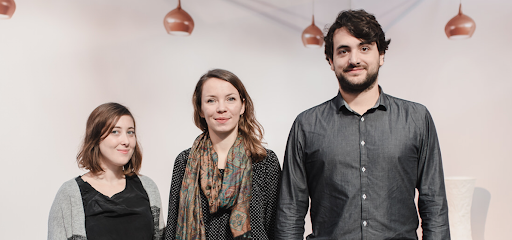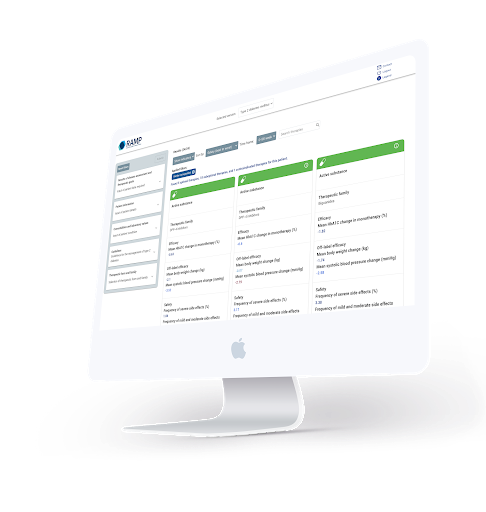- RAMPmedical was founded in Berlin in 2015.
- They offer an app that uses AI to comb through existing medical research to suggest the right treatment for each patient
- Reliability of the research is taken into account, as are each patient’s contraindications and possible undesired effects of drug-drug or drug-food interactions.
- The app supports such conditions as type 2 diabetes, hypertension and pneumonia, with more treatments coming soon.
- The startup was a finalist of the 100 Wolves Pitching Contest.
In Poland, trust in the medical profession has been weak for years. This is made even worse by the lamentable state of the underfunded and overworked healthcare system. RAMPmedical, a Berlin startup, might just have a solution: research-based, AI-assisted therapy decision making.
How does it work? The doctor inputs a patient’s data, such as demographics, lab results, pre-existing conditions, and medication, into the app. For convenient access, RAMPmedical is available as a desktop or mobile website, as an Android application, or it can be easily integrated into a hospital’s or clinic’s IT system, in which case the patient’s medical history and data will already be available.
The app returns therapy suggestions, including the type of medicine and dosage, as well as the desired effects, possible side effects, and risks of interaction. (The startup says non-drug-based therapy options, such as lifestyle change, diet, and surgery will be available soon.) The doctor can also see the research backing a particular suggestion.

The company was founded in 2015 in Berlin by Helene Schönewolf, a marketer with experience in the pharmaceutical and Medtech industries, and Jacques Ehret, a medical researcher with machine learning expertise. Upon identifying how difficult making treatment decisions is for medical doctors, the two started working on a solution to help doctors choose the right therapy for each patient. In 2018 the company received seed funding from Startupbootcamp Digital Health, a specialized accelerator based in Berlin. In June 2020, the startup ascended into the finals of the 100 Wolves Pitching Contest, an online event from the organizers of the Wolves Summit. ITKeyMedia had the honor of being a partner to the conference. The 11th edition of the Summit will take place on the 5-7 October 2020.
RAMPmedical currently suggests therapy options for patients with type 2 diabetes, arterial hypertension, bacterial community-acquired pneumonia, as well as suggestions for antiplatelet treatments. The startup promises to include anticoagulation (blood-thinning) treatments and solutions for patients with dyslipidemia, or abnormal fat levels in the blood, in the near future. Visitors to the website can vote on other conditions that they would like to see included in the app in the further stages of development; the options include depression, epilepsy, breast cancer, and Parkinson’s disease, among others.
RAMPmedical keeps a rich database of research studies that they rate on reliability and usability, as not all studies are created equal. The studies are then analyzed with the use of natural language processing (NLP) algorithms. Artificial intelligence also helps fill the gaps in research, by predicting drug-drug interactions through molecular analysis of substances as well as making predictions of long-term behavior. All this lets the app match the right therapy to each patient, but it also means that in some cases, the doctor cannot see the entirety of the evidence that a suggestion is based on.
Helene Schönewolf, co-founder and CEO, believes that this anxiety is merely a momentary concern. “I do believe that digital health will be more present and it will be a must in the hospital environment”, says Helene. “It is written in the German civil law that a doctor must provide the best possible treatment. As all kinds of digital health applications help doctors to perform better, doctors won’t have a choice and shouldn’t have the choice to just not use means to provide better care”, she puts bluntly.

Mariusz Truszczyński, a Polish cardiologist and the Chief of Cardiology at the hospital in Drawsko Pomorskie, sees potential in the app. “With so many potential drug-drug interactions, it’s easy for a doctor to overlook some of them. In anticoagulation therapy, clinical studies are highly complex, encompassing many distinct patient groups and scenarios, which makes it hard to keep oneself updated. A useful expansion would be rare diseases and complex sets of symptoms, as well”, counts the cardiologist.
“I don’t know anyone who could read all the cardiological research and acquaintance themselves with all the source data”, he says, adding that he mostly uses medical journals, cardiology websites, guidelines from the European Society of Cardiology, and conferences to keep his knowledge up to date.
Mariusz points out the shortcomings of the approach known as evidence-based medicine or EBM. “I’m not sure if the program can take a patient’s special needs into account. For example, will the patient be able to afford the therapy? In Poland many newly developed drugs, often the most effective and safest, are unavailable or not refunded, so the patients may have a hard time paying for them. Regarding the patient’s mental state and functional independence – will they be able to take the medication several times a day without supervision, or should we simplify the treatment at the expense of effectiveness?”
He also sees a potential issue the startup may have with scope expansion towards different medical fields. “Cardiology is a field with much evidence on the effectiveness of different diagnostic and therapeutic methods. It could be harder to expand into other branches of medicine, where there’s not as much clinical evidence and the decision-making is based more on the expert consensus”. He does, however, note that the application of EBM is known to be financially beneficial to healthcare systems in the long run.
Overall, the cardiologist sees RAMPmedical as potentially useful especially for general practitioners or family doctors. “It’s particularly hard for them to keep up with the progress in the cardiological field because they are so overworked”, he says. “I would definitely use the app too, but I’d treat it as an assistant in decision making – I wouldn’t agree to it having the final say on which treatment to choose. I wouldn’t like the app to be mandatory – solutions like these are being introduced in the USA, where the medical practice is more algorithm-based, and the diagnose and treatment processes are simplified. That’s not necessarily good for the patient. Doctors do have a sense of when to follow the route traced by the algorithm, and when to choose another way.”
The use of AI in medicine is on the rise. Just last year, a review found that deep learning algorithms perform equally as well as doctors when it comes to interpreting medical imaging (eg. X-ray) for signs of disease. Also in 2019, the British government allocated £250 million to the creation of the NHS AI Lab and the development of artificial intelligence-based tools for the needs of the National Health Service. Similar natural language processing technologies to the ones utilized by RAMPmedical have recently been used to compile the available research on COVID-19 and help advance the search for a vaccine. Yosh.AI, a Polish startup delivering AI-based voicebot solutions to retail companies, created a voice and text bot specialized in helping potential COVID-19 patients. Called Coronavirus Info, the bot won the WHO’s Global Hackathon and was later adopted by the Polish Ministry of Health.

Marek Kawka is a journalist based in Warsaw and a graduate of SGH Warsaw School of Economics. His interests include podcasting and the ways humans shape the modern world and vice versa.





